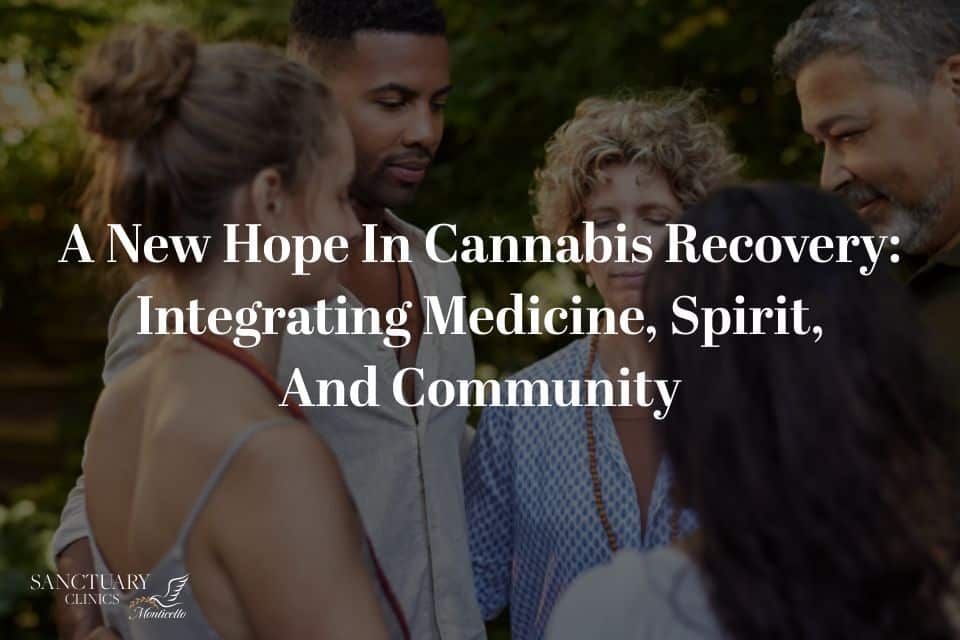At Sanctuary Clinics, we believe in treating the whole person—mind, body, and spirit. So when a promising new study emerges showing that a medication may help reduce cannabis cravings, we pay attention.
A fresh retrospective cohort study from Nature / Molecular Psychiatry reports that semaglutide, a glucagon-like peptide-1 receptor agonist (GLP-1RA) already approved for diabetes and weight management, was associated with a significantly lower risk of both new-onset and recurrent cannabis use disorder (CUD) in real-world medical populations.
Let me share what this means—and how Sanctuary Clinics is responding by weaving together scientific innovation and spiritual care.
What the Study Tells Us
Here are the key findings:
- In patients with obesity (no prior CUD), those treated with semaglutide had a 44% lower hazard (HR 0.56) of developing CUD over 12 months compared to matched peers on non-GLP-1 anti-obesity drugs.
- Among patients with prior histories of CUD, semaglutide users also had a 38% lower hazard of relapse (HR 0.62) over the same timeframe.
- The effect was consistent across subgroups—gender, age, race, and in patients with and without type 2 diabetes.
- In a parallel cohort of patients with type 2 diabetes, semaglutide was likewise associated with reduced incidence and recurrence of CUD.
- The authors caution that mechanisms remain speculative and that randomized clinical trials are needed to confirm whether semaglutide or other GLP-1R agonists could become a part of the standard toolkit for cannabis use disorder.
In short: for the first time in a large, real-world dataset, we have a drug showing association with lower rates of cannabis addiction onset and relapse. That’s a breakthrough—not a cure-all—but a hopeful signal.
But context matters. This medication is one tool—not the whole plan. And it must be used in the right setting, with oversight and integrated care

Why Sanctuary Clinics Is Well Positioned for This Moment
At Sanctuary, we’ve long held that true recovery is not just about removing a substance. It’s about renewing life:
- Spiritually centered community: Patients experience authentic community on campus, sharing meals, worship, accountability, prayer, and mutual support with staff, clinicians, and one another.
- Faith-informed disciplines: Spiritual disciplines like worship, Scripture reflection, prayer, spiritual direction, and faith-based counseling strengthen resilience beyond symptoms.
- Long-term continuum: Our care doesn’t stop when someone leaves the program. Alumni, aftercare, and ongoing discipleship support help guard against relapse and foster flourishing.
- Clinical integrity: Sanctuary Clinic’s licensed physicians and mental health professionals prescribe and monitor medications safely. That includes considering emerging therapies like GLP-1 agonists when supported by evidence.
In other words: we welcome medical advances—but we treat medicine as one pillar, not the foundation. The foundation remains Spirit, community, and holistic restoration
Get Help Today.
We are here to help you through every aspect of recovery.
Let us call you to learn more about our treatment options.
We are here to help you through every aspect of recovery. Let us call you to learn more about our treatment options.
How This Medication Fits Within Our Philosophy
- Evidence + Oversight
We don’t use any drug just because it sounds promising. Before prescribing, we evaluate risks, contraindications, and how it fits into each person’s physical and psychiatric profile. Semaglutide’s new data provides a rationale—but it must be tested further, and we await clinical trials for cannabis-specific use. - Complement, Not Replace
The medication addresses cravings and relapse potential. But it doesn’t heal the underlying trauma, beliefs, relational wounds, or spiritual brokenness. That’s where therapy, discipleship, community, and spiritual formation come in. - Tailored, Not Standardized
Each individual’s journey is unique. Some may benefit strongly from semaglutide; others may not be good candidates. We assess, adapt, and walk alongside—always treating the person, not the pill. - Lifelong Care
Medication may be time-limited. But spiritual formation, community bonds, and aftercare pathways remain long-term. We believe the greatest healing is not just abstinence—but joy, purpose, and sustainable health.

A Vision: Pioneering Whole-Person Recovery
We believe Sanctuary Clinics is one of the few treatment centers in the Christian mental health space ready to bridge faith, community, and cutting-edge medicine. This new semaglutide data opens a door—and we intend to walk through it faithfully, carefully, discerningly.
We don’t want to chase fads. But when science begins to validate what clinicians and patients have long suspected—there is hope. We want to pioneer ethically, pastorally, and scientifically.
In the months ahead, we will:
- Continue monitoring emerging trials and publishing outcomes
- Train staff and physicians in safe medication management alongside spiritual care
- Share success stories (while safeguarding confidentiality)
- Invite partners and churches to support this integrative model

Do You or Somebody You Love Need Help?
If you or someone you know is battling cannabis dependency—or craving stability in any toxic cycle—please know:
- You are not alone. Recovery is possible.
- We want to help you holistically—body, mind, and spirit.
- Medication may be part of your journey, but it is not the whole journey.
I invite you to call and talk with one of our care guides today. We’ll listen, assess, and help you chart a path forward—all within the safe embrace of Christ-centered community.
You don’t have to face this alone. Let’s walk toward healing together.
Get Help Today.
We are here to help you through every aspect of recovery.
Let us call you to learn more about our treatment options.
We are here to help you through every aspect of recovery. Let us call you to learn more about our treatment options.
In hope, faith, and renewal,
Dr. Sesi Akoto
Medical Director, Sanctuary Clinics
Author, How to Help Your Loved One Get Off Cannabis







